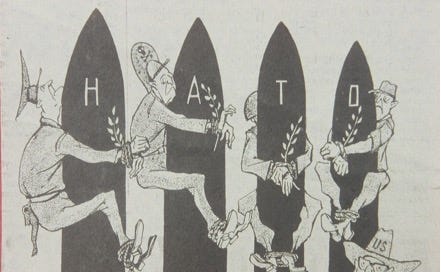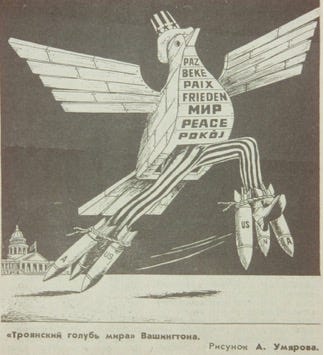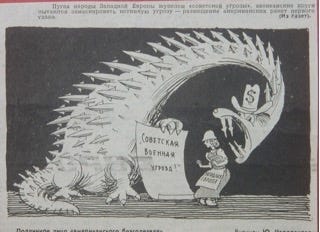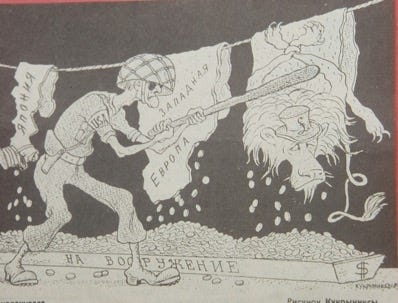Ukraine -Deja Vu 1984: Political Egocentrism, Nuclear Narcissism and Political Maturity
Back Then in the USSR
In 1984 I went to the USSR with the Association of Humanistic Psychology as a citizen diplomat during the height of the Soviet-American nuclear arms race. That was the good old days when Reagan called the USSR “the Evil Empire.”
I put aside my shyness to become a speaker for Physicians for Social Responsibility on the psychology of the arms race. I did slide shows (on a clunky old carousel projector) on the image of the enemy.[1] Political cartoons illustrated concepts like archetypes of enemy images, the mirror image of the enemy, the function of enemy images, etc. (I will organize these slides for Substack)
I brought copies of my booklet on “Changing the Image of the Enemy”[2] to the USSR. Someone who saw my work gave me these 5 cartoons from an October 1984 Soviet newspaper. This is how the US government was perceived by the Soviets 38 years ago. They liked the American people then, and American jeans, differentiating us from our government.
The KGB got to see my booklet during my second experience with them, having been expelled in 1971 as a young, poorly prepared student trying to visit Refuseniks. But that is another story.
A few years later, I was denied a visa, recognized as a persona non grata, to return with my Peace Research Associates colleagues for a meeting with Gosteleradio, the Soviet State TV network, to plan a Philadelphia – Leningrad Sister Cities Project,“ spacebridge” between families, three generations, to humanize the enemy. We met with Gostelaradio in New York. US TV stations refused to meet with us. Underdogs tend to be more open.
Déjà vu: The More Things change …
Cold War rhetoric rhymes with today’s hot war rhetoric., with media consumed by moral outrage, hate and fear, bombarding us with enemy imaging. Few reflected on how the Soviets, now Russians, perceive us. I called it “nuclear narcissism.”
Never fight evil as if it were something that arises totally outside of yourself. -- St Augustine
Metacognition – Seeing How They See Us
Swiss psychologist, Jean Piaget was the first to systematically study children's cognitive development. In 1956, he conducted an experiment on perspective-taking to determine when children overcome egocentrism and are able to perceive or understand situations from another’s point of view.[3]
By age 7 or 8 children were capable of “perspective taking,” though younger children can as well. The role of parenting, education and the media in promoting or discouraging empathy was not in the purview of these cognitive experiments.
I am positing a concept of “political egocentrism,” a function of mass psychology. People capable of personal empathy and perspective taking, when frightened, psychologically manipulated, deprived of alternative viewpoints, many regress to more primitive levels of psychological functioning including Groupthink.
Today, as always, those psychologically mature and capable of political perspective taking, who express the slightest awareness of how Putin may perceive us, who have a historical view of broken promises of not expanding NATO to the east, a feeling of encirclement that we would never stand for, the context of a long history of being invaded, of being humiliated and not given credit for defeating the Nazis, etc. are vilified, threatened and ostracized as traitors. Many are not aware that after the fall of the USSR that Putin requested to be part of NATO and was rebuffed, i.e. humiliated.
People who understand conflict dynamics, psychology and social science, who describe Putin’s perspective, who tried to warn and predict preventable provoked escalation, people like Professor John Mearsheimer political scientist and Tulsi Gabbard, United States Army Reserve officer who served in Iraq, a former US congressmember, and a former Democratic presidential candidate is called a coward and far, far worse.
Many now recognize the role of the humiliation and infliction of pain and suffering caused by the Treaty of Versailles after World War I which created fertile ground for Hitler and Goebbels, Minister of Propaganda, to arouse people’s sense of grievance and desire for dignity and revenge. This does not excuse Hitler or diminish his evilness.
Most public discourse is concrete, simplistic, us/them, good/evil, black/white, ahistorical and egocentric. It is psychologically ignorant, unaware that people are more dangerous when afraid, as are we. Expanding NATO creates fear. When we act out of fear, we justify the fear of the Other and escalate in a cycle of mutual provocation I call “self-fulfilling paranoia.”
“The Madness that is carrying the world closer and closer to nuclear war has at its core a psychological explanation: Each side, though fundamentally afraid, misperceives the nature of the danger it faces. Each side imagines that it faces an inherently, implacably aggressive enemy, when it actually faces an enemy as fearful as itself - an enemy driven mainly by fear, to do the things that lead to war.” -- Psychologist Ralph K. White, Fearful Warriors.[4]
Below are
* Perspectives on Ukraine and Russia
* Short, clear, wonderful piece Preventing Armageddon by Mort Deutsch
* THE POLITICAL MATURITY SCALE: BEYOND RIGHT-LEFT POLITICS
Perspectives on Ukraine and Russia
Ukraine on Fire, Oliver Stone’s 2016 film, detailed history, banned onsite platforms
https://rumble.com/vwsh2k-ukraine-on-fire-2016-oliver-stone-director-igor-lopatonok-mirror.html
“History of Russia: Rurik To Revolution”. 45 min (sent by Celia Farber)
HTTPS://WWW.YOUTUBE.COM/WATCH?V=W0WMC8C0EQ0
Why is Ukraine the West's Fault? John Mearsheimer talk from 2015 - more recent history
Articles from Transcend from perspective of conflict transformation
https://www.transcend.org/tms/2022/03/
https://www.transcend.org/tms/2022/03/on-humiliation/
Vladimir Pozner: How the United States Created Vladimir Putin. 10/2/2018
From Jeremy Hammond,
Episode of the Tom Woods Show, the single most informative content I've seen for understanding the context.
Glenn Greenwald, On Ukraine.
The second is this this episode of Glenn Greenwald's System Update, in which he does a phenomenal job of exposing how mainstream journalists, as always during times of international conflict serve the government by propagating a single deceptive narrative and disallow any alternative perspectives rather than properly informing the public about the issue.
https://consortiumnews.com/2022/03/22/caitlin-johnstone-ukraines-agency-the-cia-kind/
Thanks to Barry for sending this
THE POLITICAL MATURITY SCALE: BEYOND RIGHT-LEFT POLITICS
by Diane Perlman, Ph.D © 2003
Political Maturity in Addressing Conflict Scale (PMACS) Items
Introducing the Concept of Political Maturity
This is an attempt to reframe the simplistic, dualistic right-left, liberal - conservative categories in public discourse according to the dimension of “Political Maturity.” Right - Left categories are used to reduce, dismiss, and demonize those with opposing views in ways that stop thinking and foreclose dialogue. By being descriptive, issues can be raised more accurately, intelligently, deeply and with greater maturity. The Political Maturity Scale is intended to take us “outside the boxes.”
Politically Immature vs. Politically Mature
Strategic Maturity in policies, rhetoric, and actions
“First-order change” - addressing the symptom vs. “Second-order change” addressing the relationship system
Provokes unintended consequences vs. Produces intended consequences
Increases tension vs. Decreases tension
Reactive vs. Proactive
Increases fear and danger vs. Decreases fear and danger (people are more dangerous when afraid)
Provocative, threatening, punishing vs. Calming, reassuring, positive inducements
Destructive vs. Constructive
Polarizing vs. Collaborative, Synergistic
Punitive, Retributive Justice vs. Restorative, Reparative, Transitional and Transformational Justice
Violent force vs. “Metaforce™" (political, economic, social, educational, moral force, positive inducements)
Foreclosing options vs. Generating new options
Ends justify means vs. Using better means for better ends, integrity of means and ends
Bilateral, dualistic vs Multilateral, bringing in helpful parties, stakeholders
Humiliating, intimidating, backing into a corner vs Giving adversary a face-saving way out
Win/Lose orientation vs Win/Win, Mutually beneficial strategies
“Conventional wisdom" vs Actual wisdom, depth, creativity
Short term focus vs long term thinking, intuition
Reckless policies vs. Cautious policies
Domination vs Mutuality
Mutually Assured Destruction vs. “Mutually Assured Survival™"
Cognitive Maturity
Misperceives cues vs. Perceives cues accurately, intended meaning
Focus on one dimension at a time vs ability to focus on more than one dimension (Piaget)
Simplistic, concrete, black & white thinking vs. Complex, multidimensional, nuanced thinking
Rigidity vs. Flexibility, Adaptability
Immediate focus vs. Long-range thinking
Superficiality vs. Depth
Linearity vs. Multidimensionality
Theory driven, self-justifying vs. Data driven, willing to revise opinions and attitudes
Poor reality testing, perceptions dominated by emotions and false beliefs vs. Objectivity, seeing patterns
Static, compartmentalized, fragmented view vs. Dynamic understanding
Dishonest vs. Truthful
Acausality, see events as unrelated vs. Causality, understanding cause and effect
Ahistorical, acontextual vs. Contextual
Dichotomous vs. Transcendent approach
Emotional, Relational Maturity
Gripped by right & wrong vs. Focus on improvement
Concrete, physical, psychologically ignorant vs. Psychological, dynamic understanding
Me and my people are always right vs ability to criticize oneself and one’s group when warranted
Self-absorption vs ability to take perspective of the Other
Bravado, arrogance vs. Sensitivity, humility, vulnerability
Need to intensely hold certain beliefs vs. Willingness to change attitudes and beliefs based on new information
Ego Driven vs. Motivated by Higher Self, Self-Originating
Justify previous actions, statements, beliefs vs. self- criticism, learning from experience capacity to apoligize
Need to blame other vs. curiosity, responsibility, understanding Other’s motivation, rationale (even if you don’t agree)
Denial of responsibility for one’s actions, effects on Other, provocation vs. Taking responsibility for effects of one’s actions on Others (Perlman’s “Political Heisenberg Insecurity Principle”)
Externalization vs. Self-awareness
External locus of control vs Internal locus of control
Gripped, consumed by emotional forces vs. clear, objective thinking
Denial of death, desire to master death vs. Awareness of mortality and vulnerability
Proud vs. Humble
Ruthless, cold expedience vs. Compassionate
Primitive, archetypal imagery vs. humanized, mature understanding
Dehumanization of Other vs. Empathy for the Enemy
Submission to authority, (only following orders) vs. Willingness to challenge authority
Projection vs. Consciousness
Stereotyped, primitive enemy imaging vs. Understanding the Other
Spiteful vs. Yielding
Vengeful vs. Problem-solving, Healing
Controlling, dominating vs. Empowering
Paranoid style (possibly self-fulfilling) vs. Reassuring style
Misrepresent intentions vs. Communicate sincere intentions
Undermine trust vs. Build trust
Under/Overestimate Other Bias vs. Accurate estimation
Creating enemies vs. De-enmification
Engendering moral outrage vs perspective taking
Political Maturity Ratings
1 Destructive Dictators & Despots 2 Dangerous Unconsciously Impulsive 3 Harmful Immature 4 Colluding Neutral 5 Helpful Mature 6 Constructive Wise 7 Creative Transcendent – Visionary, Transformative. Courageous
Preventing Armageddon in the 21st Century
Morton Deutsch, Ph.D.
Psychologists for Social Responsibility
Note: Mort gave me the 1984 version of this document to distribute at the 2005 Nuclear Nonproliferation Treaty Review Conference where I was a civil society representative for Psychologists for Social Responsibility. He revised it for the 2010 NPT Review Conference. I love this clear, concise, self-evident description of conflict and find it very valuable.
***
Some conflicts – whether between spouses, labor and management, or nations – seem to escalate out of control. They follow a malignant course toward outcomes that nobody wants. People who are caught up in such conflict usually find ample justification for blaming the other party. It seldom occurs to the opponents to look hard at the conflict itself, including the conditions that intensify it or might de-escalate it.
Psychologists and other social scientists are well acquainted with such conflicts. Conflict research yields knowledge that has been successfully applied and can be productively applied to the conflicts between Palestinians and Israelis, India and Pakistan, the volatile situation with Iran, and other conflicts that seem to be stuck in the kind of escalating sequence that could lead to continued mutual harm. The findings of research on conflict do not replace the need for expert understanding of our antagonists or of the technical side of arms negotiation. But focusing on the typical characteristics of the conflict process itself, rather than exclusively on the characteristics and motives of our antagonists, may suggest a different approach for dealing with an adversary. How we define the problem determines where we look for solutions.
What do we know about malignant conflicts – ones that lead to bad results from everybody’s standpoint?
A win-or-lose orientation tend to escalate conflicts. Under controlled laboratory conditions research has shown that when the participants define a conflict as a win or lose situation, several consequences are predictable: a) communication is impaired, reinforcing existing stereotypes and encouraging misinformation and error; b) the opponents become more suspicious of each other, more sensitive to difference and threats, and c) each party becomes convinced that a solution to the conflict can only be found through superior force or by outwitting the antagonist. Thus, disputes over specific issues that might be resolved to the satisfaction of both parties become struggles solely for superior power.
Malignant conflicts encourage misperception and misjudgments that yield unwanted results. Research shows that during such conflicts, each party tends to perceive its own behavior more favorably than the other’s, and to look at the conflict from a “blaming” rather than “problem-solving” point of view. As the conflict escalates, the actions taken by each party commit each more deeply to policies that perpetuate the conflict; the opponents thus become locked into their positions of self-interest rather than open to exploring mutually desirable policies and programs. Information communications and contact, which might mitigate the conflict, are reduced. All parties become so focused on winning that they readily lose sight of their basic interests – which is the case of many intractable conflicts whether at the interpersonal or international levels.
Psychological experiments suggest that when one party in a conflict attempts to increase its security without regard for the security of the other party, the attempt readily becomes self-defeating. Such a situation is potentially catastrophic when the stakes involve nuclear war. If military inferiority is dangerous, so is superiority. It is dangerous for either side in a conflict to feel tempted or frightened into action, or to have grounds to believe that its antagonist might be so tempted or frightened. According to this analysis, our security and that of an adversary can only be obtained through our mutual security.
Conflict research provides no easy answers to our difficult conflicts. However, by focusing on factors involved in the dynamics of the conflict itself, rather than simply on the blameworthiness of our opponent, conflict research has highlighted the need for different strategies from those that follow from our own blind involvement in the conflict process. Such strategies ought to include initiatives aimed at opening communication and finding common objectives. Neither party in a conflict has a complete monopoly on good or evil. Neither is insane. It is the conflict process that is crazy. With imagination, patience, and commitment, we can do something about that.
References
Deutsch, M. (1973). The resolution of conflict: Constructive and destructive processes. New Haven: Yale University Press.
Deutsch, M., Coleman, P. T., & Marcus, E. (Eds.). (2006). The handbook of conflict resolution: Theory and practice (2nd ed.). San Francisco: Jossey-Bass.
Frank, J. D. Sanity and survival in the nuclear age. (1962). New York: Random House. Jervis, R. (1976). Perception and misperception in international politics. Princeton: Princeton University Press.
Psychologists for Social Responsibility seeks to bring greater psychological knowledge and public awareness to the many issues highlighted in this brief overview. For more information, please contact us at info@psysr.org. We encourage new PsySR members to join in these efforts. Media inquiries are also welcome.
PsySR Advisory Board member Morton Deutsch is the E.L. Thorndike Professor Emeritus of Psychology and Director Emeritus of the International Center for Cooperation and Conflict Resolution (ICCCR) at Columbia University. He can be reached directly at deutsch@exchange.tc.columbia.edu. This perspective is adapted from an earlier publication, “Preventing Armageddon,” by Morton Deutsch and Brewster Smith, published by the American Psychological Association.
Mort Deutsch, PhD, pioneer in conflict transformation and political psychology. Founder of the International Center for Cooperation and Conflict Resolution (ICCCR) at Columbia University in 1986, Global Advisory Board Member of the Human Dignity and Humiliation Studies President of the Society for the Psychological Study of Social Issues, the International Society of Political Psychology.
He died in March, 2017 at the age of 97, and was active until the end and was a beloved, supportive colleague and mentor to many.
[1] Inspired by the work of Jerome Frank, MD, PhD, author of Sanity and Survival in the Nuclear Age, famous for Persuasion nd Healing
[3] Three Mountains Task (Piaget & Inhelder, 1956),
[4] One caveat about this quote, while psychologically true, does not account for vested, corporate. Military Industrial Congressional, Media, Academic, Think Tank (Ray McGovern’s term) forces driving the conflict and manipulating fear.










https://www.youtube.com/watch?v=0tXU0n1bsM4
Cartoon translations:
Top one says NATO, that one is obvious
The caption on the one with the planets says: The Pentagon’s Dream (the names of the planets are on the planets)
The peace pigeon says: “Washington’s peaceful Trojan pigeon”
The one with the dragon says: “Soviet war threat” although that bottom word is really hard to make out.
The fleecing one has the names Japan, Western Europe, and I think the bottom one says “for defense”